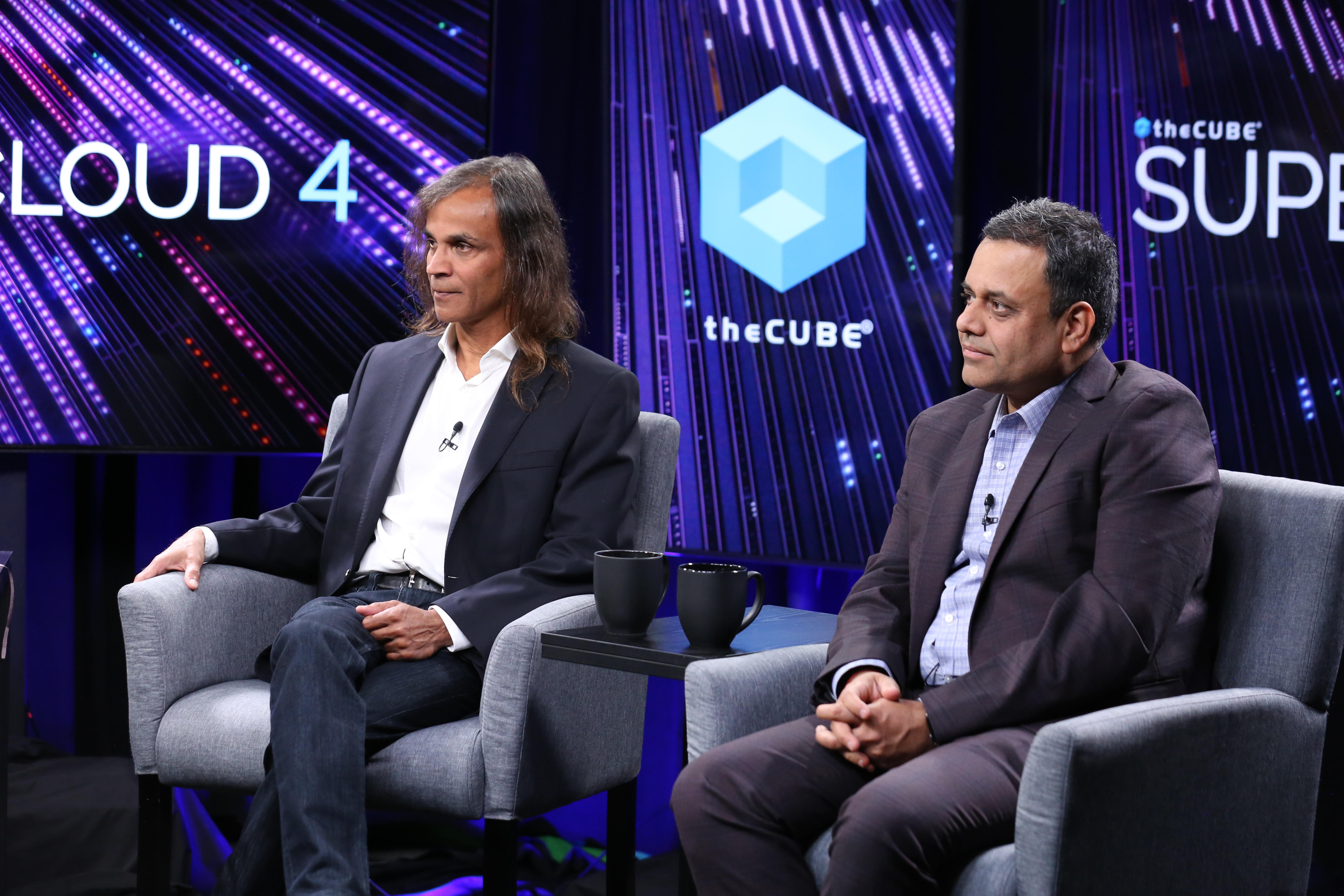 AI
AI
 AI
AI
 AI
AI
The global economy is on the cusp of another revolutionary era beyond the internet and cloud computing, driven by artificial intelligence and large language models. Against that backdrop, what signals are emerging from seasoned business veterans on the potential headwinds and challenges therein?
“We are seeing significant changes happening in how the cloud has been used, especially now — the AI/LLM, that’s a buzzword name,” said Piyush Sharrma (pictured, right), investor, entrepreneur and co-founder and chief executive officer of Accurics Inc. “It’s become super-easy to build a company, as long as you understand what the problem you are solving. There is a sufficient amount of technology available, and then you can use new technology to build more technology.”
Sharrma and Vikram Joshi (left), founder, president and chief technology officer of Compute.AI, spoke with theCUBE industry analysts Dave Vellante and John Furrier at Supercloud 4, during an exclusive broadcast on theCUBE, SiliconANGLE Media’s livestreaming studio. They discussed the opportunities and hurdles that this AI-driven landscape presents to entrepreneurs, including these veteran founders, investors and industry insiders.
The democratization of AI has been a key theme, both at “Supercloud 4” and in the general entrepreneurial landscape. The advent of LLMs, such as ChatGPT and Bard, has made AI more accessible to a broader audience, in turn enabling entrepreneurs to harness their capabilities for various applications.
As a result, AI has transitioned from a niche, specialized field to a commodity, thanks to its consumerization. Entrepreneurs can now integrate AI into their solutions and address a wide range of problems, from content generation to data analysis, according to Joshi.
“It’s the confluence of two major things happening here: One is you have massive amounts of data processing going on, and then there are the AI/ML forces,” he said. “I know the market has been saturated with conversations on gen AI and LLMs. But there’s a vast amount of opportunity in the AI/ML space outside of that too. From an entrepreneurial perspective, understanding what the problem space is, understanding real pain points — how do we identify those? The architectural tenets of entrepreneurship haven’t changed.”
Finding a compelling, pervasive problem to solve is the backbone of creating a competitive startup. Next up, however, is securing funding — and that’s still a challenge even in today’s AI age. As it stands, investors are more inclined to support startups that address pressing issues faced by a substantial number of customers, according to Sharrma.
“I keep on saying that ‘Is the problem important and also urgent?’ is where you actually start,” he said. “As an entrepreneur, when I look at anything to invest, if I am initially investing in a startup, I always look at the problem and how important it is. Is this going to be for 10 customers facing the same problem every day? Or is it going to be 1,000 customers [facing] this problem once in a month?”
Another important funding element is self-investment. entrepreneurs must demonstrate their commitment to the problem they aim to solve by investing their own money and showcasing their belief in their venture, Joshi added.
The idea of disrupting a niche by bringing a breakthrough idea is as effective today as ever. Even in markets dominated by established giants, entrepreneurs should focus on solving critical, urgent issues while leveraging the work of those existing players and entrepreneurs to position themselves as value creators, according to Joshi.
“I don’t view disruption in technology as being something that you decide upon,” he said. “If something is going to change the game, let the customers vote on it. In my case, I was thinking in terms of incremental, but significant value where you leverage the great work done by the Snowflakes and Databricks of the world. You’re standing upon the shoulders of giants and creating value, which really means finding those real pain points.”
AI, particularly generative AI, is poised to enhance security, data management and other domains. Entrepreneurs need to consider it as a tool that can transform processes, democratize innovation and create entirely new categories of applications, Joshi added.
Here’s the complete video interview, part of SiliconANGLE’s and theCUBE’s coverage of Supercloud 4:
Support our mission to keep content open and free by engaging with theCUBE community. Join theCUBE’s Alumni Trust Network, where technology leaders connect, share intelligence and create opportunities.
Founded by tech visionaries John Furrier and Dave Vellante, SiliconANGLE Media has built a dynamic ecosystem of industry-leading digital media brands that reach 15+ million elite tech professionals. Our new proprietary theCUBE AI Video Cloud is breaking ground in audience interaction, leveraging theCUBEai.com neural network to help technology companies make data-driven decisions and stay at the forefront of industry conversations.